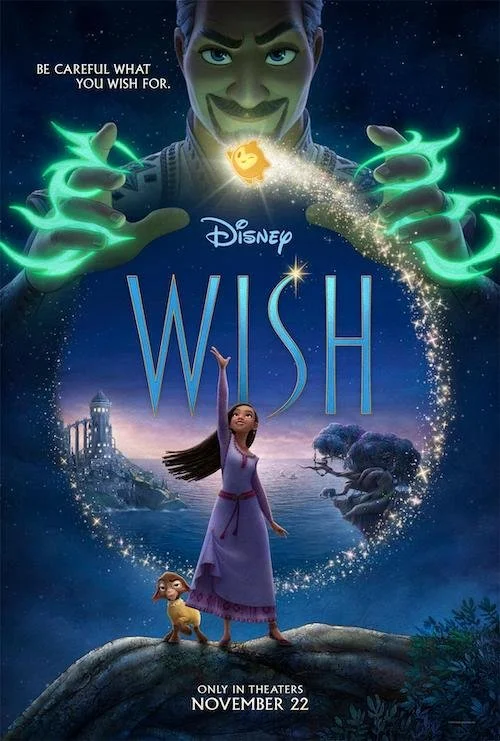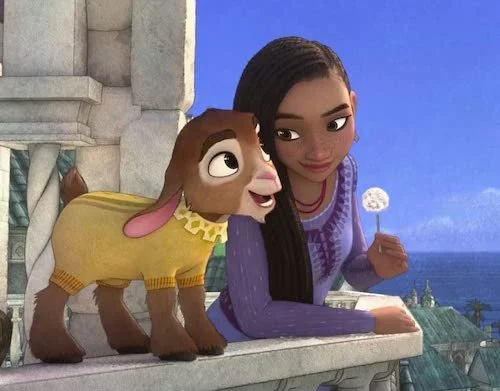Wish
Written by Andreas Babiolakis
It’s no secret that 2023 marks the one-hundredth anniversary of Walt Disney Studios. The entertainment conglomerate has been building up to this occasion and celebrating it all year long, and what appears to be the sendoff to this Centurian milestone is the latest animated feature Wish. On paper, Wish is everything such an anniversary would call for. It is a blending of hand-drawn and CGI animation that makes for an amalgamation of the entirety of Disney Studio’s art department. It is centred around the notion of wishes coming true, coming from a company that has dreamt for an entire century. There are Disney songs, archetypical characters, and a strong cast to help both come alive (particularly the sensational Ariana DeBose, whose role could have easily gone down as one of the best Disney characters in recent memory perhaps in a different film). This had all of the signs of a fantastic film, but it aches me to say that Wish not only misses its mark, it is quite the disappointment. Regardless of the -number of things I do like here, there is enough that is sub-par or flat-out bad to the point of knocking a warm, loving film down quite a few pegs.
DeBose plays Asha: a seventeen-year-old on the brink of adulthood in the kingdom of Rosas. Rosas is ruled by King Magnifico (Chris Pine, who is quite great here as well): a practitioner of magic and spells who has the ability to grant wishes. He picks and chooses whose wishes can be brought to fruition, and Asha — who is applying to be his next apprentice — nominates her grandfather Sabino’s latest wish which was made once he turned one hundred years old (likely for obvious reasons). It is through this meeting she has with King Magnifico that Asha learns that her kingdom’s king is a selfish one: one who hoards all wishes without granting very many. It’s clear that wishes mean more than just the dreams of others, as we see a king literally harvesting as many as he can (it’s money, folks: one allegory here is the hoarding of billions of dollars that don’t go anywhere or ever get spent while others starve and suffer). Asha wants to tell the world about this dark secret, but she doesn’t get very far. She needs her prayer to come true, and it comes in the form of a star (which gets named… get this… “Star”) which visits her and shows her that anything is possible when we dream hard enough.
I noticed a few things by this point. Firstly, that there was less than an hour left into the film already (yikes), and secondly that there’s something a little tone-deaf here. It’s clear by now that I am a big Disney fan, but I also don’t wear blinders. It’s tough for a studio to present a film all about wishes and dreams coming true despite a selfish overlord when they hike up streaming prices, hoard properties in their vault so no one else ever gets access to them, just cut seven thousand jobs earlier this year, and whose current CEO, Bob Iger, was at the forefront of both major Hollywood strikes as a villainous type who proclaimed that those striking weren’t being fair (meanwhile, they were losing homes and going hungry while he makes billions a year). Such a lack of self-awareness doesn’t really affect how I grade a film because I try not to let external elements affect a subjective verdict, but it also needs to be brought up. Disney was once this vessel for how dreams came true, but a lot of their activity lately has kind of pointed towards the antithesis of this very idea: only select people with the proper means will ever have their dreams come to fruition.
I wouldn’t mind as much if the film had a stronger take on its intended message for children, but this leads me to the biggest fundamental problem with Wish: it is one of the most thinly written Disney films perhaps ever. The entire film feels like the final act of a fuller Disney film. We get our villain’s reveal very early, see very little legwork in terms of character arcs and story gestation, and it feels like we’re in the final stretch of the film from twenty minutes in. There isn’t really much story here at all: King Magnifico is anything but magnifico, and Asha is trying to stop him by any means necessary. He gets more evil, and she pushes more and more to persevere. That’s it. Wish feels like it has as much narrative juice as a snippet of Zootopia (the twist, the aftermath of said twist, and the quest to rectify what was done). The only character I feel like I got to know very well was Asha. Everyone else is an acquaintance or loved one, a villager, a talking animal thanks to Star’s powers, and… well, Asha, King Magnifico, and Star. If it wasn’t for the CGI enhancements of the traditional drawing, I would swear you could see right through the paper the animators drew on. The visuals may be astounding, but Wish’s story is full of preliminary sketch-work and nothing more. This is not a finished story. It isn’t even close.
Despite how cute and heartwarming Wish gets, its thinness and clunkiness really do get the better of it.
If the story doesn’t try enough, the songs try a bit too hard. If it wasn’t for the beautiful vocal work of DeBose and the playful-yet. threatening singing of Pine (and all of the other strong contributions in between), these songs may be next to unlistenable. These songs try to sprint through exposition and narrative revelations with ten thousand words in each bar, to the point that words are getting cut off (“Prob” instead of “Problem”, as a means of rhyming with “Job” in the next line) or are exhausting to wrap one’s mind around (convolutedly long words that don’t come off nearly as clever as was clearly intended). The actual melodies and instrumentation are nice, but I honestly felt like all of these songs could have come from the same sequence; outside of their emotional tones, they are all similar enough to be swapped around if we got rid of these lyrics. You could still tell that “Be Prepared” is an intense call-to-action by an evil royal, whereas “Circle of Life” is a celebration of being alive and waking up in the morning even without their lyrics. What sets “At All Costs”, “I’m A Star”, or “A Wish Worth Making” apart outside of their lyrics and when they are placed in the film? They don’t have their own identities outside of the one unifying factor: they’re all Wish songs. It isn’t enough to make them stand out beyond their already-existing flaws. Otherwise, I do think “Welcome to Rosas” and “Knowing What I Know Now”, despite also being imperfect, are the two stronger songs here because of the former’s playfulness and the latter’s weight of regret.
”This Is the Thanks I Get?!” could have been a fun song if its lyrics weren’t so insanely basic, with King Magnifico hitting on himself for half the song and then spewing out ill-conceived villain tropes for the remainder. This only reminded me of how hastily written much of the film is, especially the dialogue of most characters. King Magnifico himself absolutely wastes a good performance by Pine because of how poorly he is written. He is an evil man who exists just to be evil, with no rhyme or reason as to how he got this way; you can argue it’s because he’s in a place of power and power corrupts people, but then that once again isn’t a good look if this plainly-made point is being presented by Disney itself in 2023. His dialogue is even worse than his narrative blueprint, as he clucks out the kinds of villain platitudes that you’d find in an AI’s version of a Disney film. This isn’t the work of an established, beloved, and prestigious company that has been at it for one hundred years. I don’t think a film is hinged entirely on its villain, but in the case of Wish — which is so swiftly paced, where songs take up at least a fifth of all runtime (if not more), and the entirety of the story is reduced to its most basic parts — a proper villain was necessary. He may be the biggest sore point of all.
It may seem like I am enjoying all of this slander, but I really do want to love this film. Its warmness is sweet, its animation is remarkable, and I personally really liked Asha as a character and hoped that she had a better film behind her. There are so many other things that also brought a smile to my face, including goat Valentino (who possesses more life and soul than King Magnifico even before he is granted the ability to speak, and even then Alan Tudyk makes him even more loveable without ever overstaying his welcome). Without being too salty as a thirty-something, there’s something tender about the film’s insistence on never letting dreams die or allowing others to dictate how life turns out for you, but Wish also really needed to do a better job at conveying these notions. Then there are the oft-discussed Easter eggs to many other existing Disney properties which I either found appropriate (for the most part) or occasionally abrasive. Here’s a hint, and it’s all in the name: they’re called Easter eggs because you feel joyful when you find them. Tossing references at us can feel like eggs hitting our faces instead.
The ending credits go through as many Disney feature films as possible in chronological order, starting with Snow White and the Seven Dwarves and Pinocchio. This is when it truly feels like a celebration of Disney’s legacy as a company. I don’t expect Wish to be fully dependent on other existing properties; in fact, I’m glad that it is entirely its own project. However, the goal here was clearly to make a celebratory statement on behalf of the studios. It checks off all of the Disney boxes, with signature characters, the kinds of songs you’d expect, a feel-good story with the friends we make along the way, a wide-eyed protagonist who goes through the motions in search of a better life, strong animation, and the closure that we will get through this difficult thing called life together if we follow our dreams. The ideas behind Wish are honourable and noble. The execution is sadly substandard to the point where some elements are borderline horrific, which is not something I usually say about Disney films. Part of me adores Wish, and it’s the part of me that is a Disney fan and an aficionado of animation. As an adult with his head on his shoulders, Wish is anything but fully granted. Disney more than any other company should know that dreams are only the starting point and it is up to us to make them come true. That’s literally the moral of this film! Wish feels like the very title: a wish. It is never brought to fruition. It is never chased. It is only ever dreamed. It is a nice dream. We sadly do not get what could have been because the dream was given up on as soon as it was made. What an absolute shame.
Andreas Babiolakis has a Masters degree in Film and Photography Preservation and Collections Management from Toronto Metropolitan University, as well as a Bachelors degree in Cinema Studies from York University. His favourite times of year are the Criterion Collection flash sales and the annual Toronto International Film Festival.






